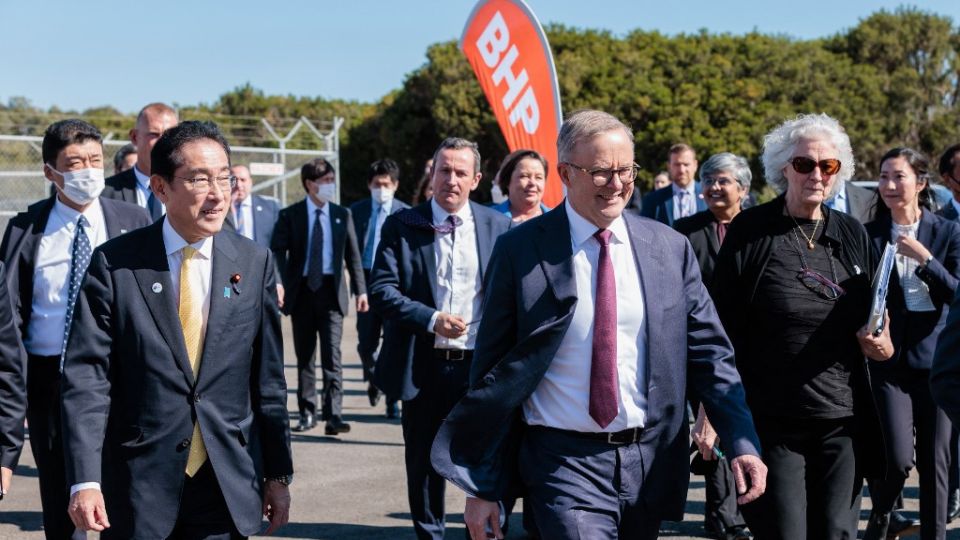November 21, 2022
JAKARTA – Japanese Prime Minister Fumio Kishida and his Australian counterpart Anthony Albanese pledged Saturday to boost practical defense cooperation between their two nations amid China’s growing assertiveness in the Asia-Pacific region.
After talks in Perth, Kishida and Albanese signed a joint declaration in which Japan and Australia agreed to deepen trilateral security relations with the United States and to take action against countries violating international rules and norms.
Their agreement came with concern mounting that China might step up military provocations against Taiwan after President Xi Jinping secures an unprecedented third term as leader at the ruling Communist Party’s weeklong, twice-a-decade congress that runs through Saturday, Kyodo News reported.
In the latest declaration, Kishida, who began a three-day visit to Australia on Friday, and Albanese confirmed the significance of a “free and open Indo-Pacific,” a vision advocated by slain former Japanese Prime Minister Shinzo Abe.
The two leaders did not single out China in the declaration as they may be eager to monitor how Beijing’s diplomatic policy may shift following Xi’s reelection.
Albanese and Kishida also discussed climate change, expressing support for a regional transition to net zero carbon emissions and boosting investment in clean energy tech.
“Both our countries are committed to net zero by 2050,” Albanese told reporters after a signing ceremony, quoted by Reuters.
Among those efforts, the leaders agreed to help build secure supply chains between the two nations for “critical minerals, including those that are required for building the green technologies of the future,” Albanese said.
“This partnership will mean we build secure supply chains, promote investment, develop Australia’s domestic sector and make sure Japan’s advanced manufacturers have the critical minerals they need.”
In 2007, Abe and then Australian Prime Minister John Howard signed a document that recognized “common strategic interests and security benefits embodied in their respective alliance relationships with the United States.”
Ahead of the trip to the state capital of Western Australia, Kishida told reporters in Tokyo on Friday, “For Japan, Australia is an important nation with which we share universal values such as freedom and democracy as well as strategic interests.”
Japan imports natural gas, iron ore and other vital resources from Australia, making it a key partner.
Kishida has emphasized the necessity of stability in resource supply from Australia to Japan, which relies on imports for more than 90 percent of its energy needs, amid an environment of skyrocketing materials prices in the wake of Russia’s invasion of Ukraine in February.
Japan regards Australia as a semi-ally as both countries in the Asia-Pacific region are part of the “Quad,” or the Quadrilateral Security Dialogue, involving India and the United States. The framework was also proposed by Abe, who was fatally shot in July.
Tokyo and Canberra have been considering steps to implement a bilateral reciprocal access agreement signed in January, aimed at facilitating the deployment of troops in each other’s nation for joint drills and relief operations.
Japan currently only has such a deal with the United States. The enforcement of the pact would serve as a foothold for the integration of security operations between Japan, Australia and the United States with an eye on a potential emergency in Taiwan.
China, meanwhile, has been attempting to bolster its security and economic clout in the region to challenge the Quad and the free and open Indo-Pacific blueprint, with Xi repeatedly describing self-ruled Taiwan as a “core interest.”
Beijing and Taipei have been governed separately since they split in 1949 as a result of a civil war. China sees democratic Taiwan as a renegade province to be reunified with the mainland.
In his opening speech last Sunday at the Communist Party congress, Xi said China will “never promise to renounce the use of force, and we reserve the option of taking all measures necessary” to reunify Taiwan with the mainland.
China also has been trying to increase its influence with Pacific island nations. It signed a security pact with the Solomon Islands earlier this year, an arrangement that would allow the deployment of Chinese police, military and other armed personnel to the country.
Kishida’s visit to Australia is the first by a Japanese prime minister since 2018. He had planned to visit Australia in January, but the trip was canceled against a backdrop of the COVID-19 pandemic. Kishida became premier in October 2021.
Albanese visited Japan in May for the Quad summit that was held immediately after he took office. In late September, he also made a trip to Tokyo to attend Abe’s state funeral.


